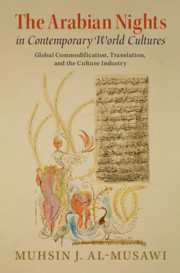 The Arabian Nights in Contemporary World Cultures
The Arabian Nights in Contemporary World Cultures Published online by Cambridge University Press: 17 August 2021
Chapter 5 complements the previous chapters in that it argues archaeology in relation to two domains whereby a history of the burgeoning of the Nights in its own lands is laid out in terms of a body of enunciations and statements. A discursive genealogy suggests multiple productions that share only a basal root, that is, the frame tale of the two kings, but not the rest like “The Merchant and the Demon.” The other domain includes early migrations of tales, and the major translational movement established by Galland. Both domains have their histories as effectively giving place “to definite types of discourse … which are related to a whole set of various histories.” In this discursive density, the issue of authorship cannot be visible. It wanes and disappears in large grids of narrative engagements. Furthermore, beginnings cannot be dissociated from a narrative corpus that has its own underlying theoretical bases before the advent of the novel as a bourgeois epic.
To save this book to your Kindle, first ensure no-reply@cambridge.org is added to your Approved Personal Document E-mail List under your Personal Document Settings on the Manage Your Content and Devices page of your Amazon account. Then enter the ‘name’ part of your Kindle email address below. Find out more about saving to your Kindle.
Note you can select to save to either the @free.kindle.com or @kindle.com variations. ‘@free.kindle.com’ emails are free but can only be saved to your device when it is connected to wi-fi. ‘@kindle.com’ emails can be delivered even when you are not connected to wi-fi, but note that service fees apply.
Find out more about the Kindle Personal Document Service.
To save content items to your account, please confirm that you agree to abide by our usage policies. If this is the first time you use this feature, you will be asked to authorise Cambridge Core to connect with your account. Find out more about saving content to Dropbox.
To save content items to your account, please confirm that you agree to abide by our usage policies. If this is the first time you use this feature, you will be asked to authorise Cambridge Core to connect with your account. Find out more about saving content to Google Drive.